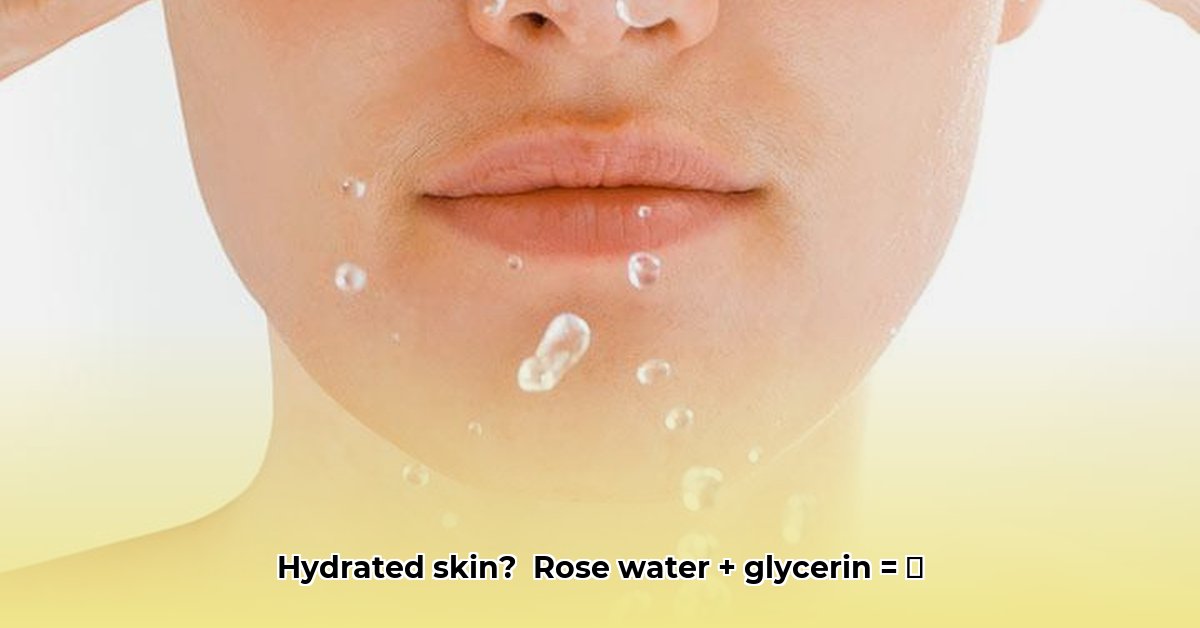
Understanding Rose Water and Glycerin for Skincare
Rose water and glycerin, two natural ingredients, offer a potentially powerful combination for hydrated and healthy skin. Rose water, derived from rose petals, is rich in antioxidants (molecules that combat skin-damaging free radicals) and possesses soothing properties beneficial for sensitive skin. Glycerin, a humectant (a substance that attracts and retains moisture), doesn't add moisture itself but draws it from the environment, keeping your skin plump and hydrated. Together, they create a synergistic effect, soothing and hydrating your skin. But does this mean it's a miracle cure? Let's explore.
The Science Behind the Synergy
While anecdotal evidence supports the benefits of rose water and glycerin for skin, rigorous scientific research on their combined effect is limited. Dr. Anya Sharma, Dermatologist at the Cleveland Clinic, notes that "while individual benefits of rose water (anti-inflammatory and antioxidant) and glycerin (humectant) are established, more research is needed to definitively quantify their synergistic effects when combined." This highlights the importance of individual testing and careful observation of your skin's response.
Crafting Your Personalized Rosewater-Glycerin Serum: A Step-by-Step Guide
Here's a simple, step-by-step guide to creating your personalized serum:
Gather Your Ingredients: You'll need high-quality rose water (look for "pure" or "organic" labels) and pure vegetable glycerin (USP-grade is recommended). A few drops of a gentle carrier oil (jojoba or sweet almond) are optional, enhancing absorption and nourishing the skin.
Mix Your Serum: Start with a 1:1 ratio of rose water and glycerin. Adjust this ratio based on your skin type and preferences. For sensitive skin, begin with a more diluted mixture (e.g., 1 part glycerin to 4 parts rose water).
Conduct a Patch Test: Before applying to your entire face, perform a patch test on a small area of skin (inner arm) and wait 24-48 hours for any reaction.
Apply the Serum: Once the patch test shows no adverse effects, gently apply the serum to your cleansed face and neck each evening. Let it absorb before applying moisturizer.
Addressing Potential Concerns and Limitations
While generally safe, certain aspects require attention:
- Individual Reactions: The effectiveness of the rose water and glycerin serum varies significantly. Patch testing is crucial to identify any potential allergies or irritations.
- Acne-Prone Skin: Glycerin's humectant properties can contribute to breakouts in some individuals. Start with a highly diluted ratio and monitor your skin's response closely.
- Scientific Evidence: While many experience positive results, further scientific research is needed to solidify the claims regarding the precise long-term benefits of this combination on diverse skin types.
Key Takeaways: Optimizing Your Skincare Routine
- Listen to Your Skin: Observe your skin's response and adjust the ratio accordingly. Experimentation is key to finding your perfect blend.
- Consistency is Crucial: Consistent use of your serum will yield better results over time. Regular application is more effective than sporadic treatments.
- Prioritize Quality: Choose high-quality, pure ingredients to maximize benefits and minimize potential irritation.
- Complement, Don't Replace: Consider this serum a supplement to your overall skincare routine, not a replacement for other essential products.
Three Pivotal Points:
- Rose water's soothing and antioxidant properties, combined with glycerin's moisture-locking abilities, offer potential benefits for various skin types.
- A patch test is crucial before using any skincare product, and individual results may vary.
- More research is needed to fully understand the long-term effects of this combination on different skin types and conditions.